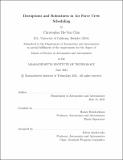Disruptions and Robustness in Air Force Crew Scheduling
Author(s)
Chin, Christopher Ho-Yen
DownloadThesis PDF (1.850Mb)
Advisor
Balakrishnan, Hamsa
Terms of use
Metadata
Show full item recordAbstract
Air Force crew scheduling involves assigning pilots to flights to fulfill mission duties and complete training requirements. Because of complex qualification requirements, as well as crew rest and availability constraints, Air Force crew scheduling is a challenging combinatorial optimization problem. Further, last-minute disruptions and uncertainties in factors like flight duration and pilot availability motivate the need for more robust schedules. Traditionally, this has been a manual, tedious, and time-consuming process. In this thesis, we leverage optimization techniques to improve the crew scheduling process. We start with a baseline integer program formulation. We develop objective functions based on two known scheduler priorities: maximizing training requirements completed, and minimizing overqualification (assigning the lowest qualified pilot feasible for each pilot seat). Then, we present a formulation to handle disruptions to an original schedule. We develop an intuitive schedule visualization tool that we use for user studies, and discuss user feedback on our scheduling algorithms. Finally, we identify key uncertainties in Air Force crew scheduling and contrast them with commercial aviation. We adapt two concepts from commercial aviation for robust crew scheduling: buffer times (slack time between two successive flights operated by the same pilots) and move-up crews (back-up crews for substitution when pilots become unavailable). This work will contribute to the core of the Puckboard scheduling software being developed by the Air Force for crew scheduling.
Date issued
2021-06Department
Massachusetts Institute of Technology. Department of Aeronautics and AstronauticsPublisher
Massachusetts Institute of Technology